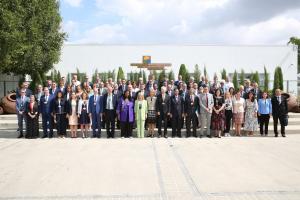
As Ministers from across the UNECE region gather in the Cypriot capital of Nicosia to outline new initiatives to work towards a sustainable and ecological future at the 9th Environment for Europe Conference (5-7 October), the final report on the Batumi Action for Cleaner Air (BACA), adopted 6 years ago at the 8th Conference, demonstrates the success of voluntary commitments to deliver concrete environmental improvements.
The Batumi Action for Cleaner Air, adopted in 2016, is a collection of 110 voluntary commitments for improving air quality within the UNECE region, made by 27 countries and 4 international organizations. The final report shows that 87 commitments were completed or are in progress.
Commitments addressed the following areas:
-
53 were dedicated to pollution reduction
-
21 to policy decisions, including on ratification of some of the protocols of the Air Convention
-
15 to establish or improve systematic, comparable and transparent monitoring activities and emissions inventories.
-
13 to improve public awareness
-
13 to increase capacity and provide technical support
The aim of the initiative was to complement the implementation of the UNECE Convention on Long-range Transboundary Air Pollution (Air Convention) and its protocols and to address the common problem of air pollution in the region. The initiative invited stakeholders to support actions that improve air quality and target the key areas of air quality management. These voluntary commitments span from monitoring and assessment, through emission reduction policies and capacity building, to information sharing and awareness-raising.
The countries participating in the initiative reflect the diversity and range of UNECE Member States stretching from Canada and the USA, across the European continent to the Caucasus and Central Asia. Georgia for example, host of the 8th Ministerial Conference, engaged in a variety of strategic activities to strengthen its national air pollution management. From 2018 it switched to European air quality standards and increased the number of its automatic monitoring stations by eight times. The country established an Air Quality Monitoring Network Development Plan and introduced a new taxation system to support the process of car fleet renovation and promotion of cleaner, as well as electric and hybrid vehicles along with the likes of Croatia and Hungary. The impact of BACA has been further perceptible on the roads of Tbilisi which replaced an entire bus fleet, which was in a depleted technical condition, with 680 new Euro 5 and 6 buses and 1,000 new minibuses in conjunction with the development of bus lanes.
In Canada, steps were taken across a number of industries to regulate emissions such as establishing requirements addressing fugitive emissions from leaking equipment in the Oil and Natural Gas Sector, updating emission regulations for off-road and stationary diesel engines as well as implementing a Code of Practice to Reduce Emissions of Fine Particulate Matter (PM2.5) from the aluminum sector. These actions were complemented by efforts in both Canada and the United States to improve quality of residential wood-burning appliances.
France, for example, introduced a national online platform for forecasting air quality. In addition to this, it adopted a number of strategies to reduce levels of emissions from vehicles implementing a national subsidy programme on replacement of old vehicles with new, cleaner ones. This was complemented by the introduction of a classification system of vehicles by emission levels and several low-emission zones with restrictions on high emission vehicles.
A number of commitments were notable for the cooperation they fostered. For example, The United States worked with UNEP to provide technical and policy advice as UNEP expands its air quality program in countries like Ethiopia. Germany and UNECE cooperated on capacity-building and technical assistance in Eastern Europe, the Caucasus and Central Asia, aiming at the ratification and implementation of the Gothenburg Protocol to the Air Convention; and Sweden supported countries in the south-east of Europe in air quality assessment and management.
Building on the high implementation rate of the 110 commitments made so far, several countries and organizations have outlined concrete steps to continue to implement and follow up on their actions under BACA in the coming years.

